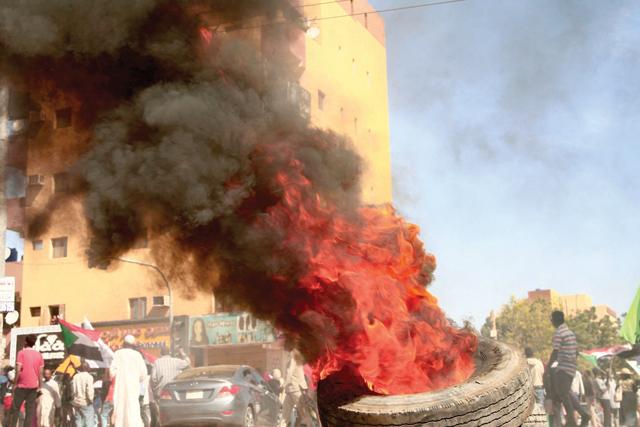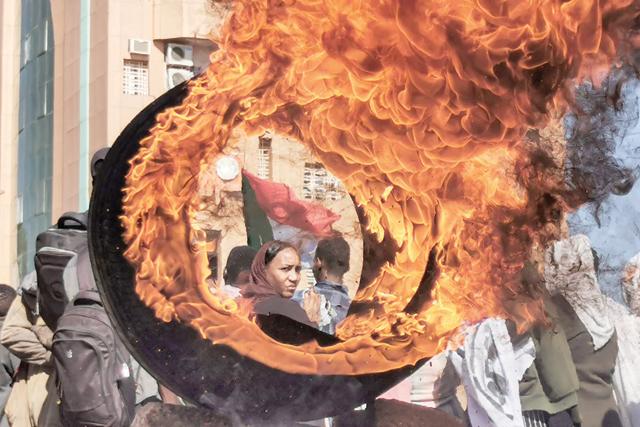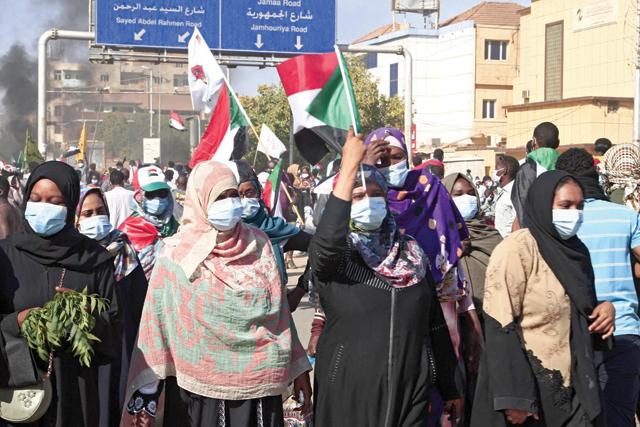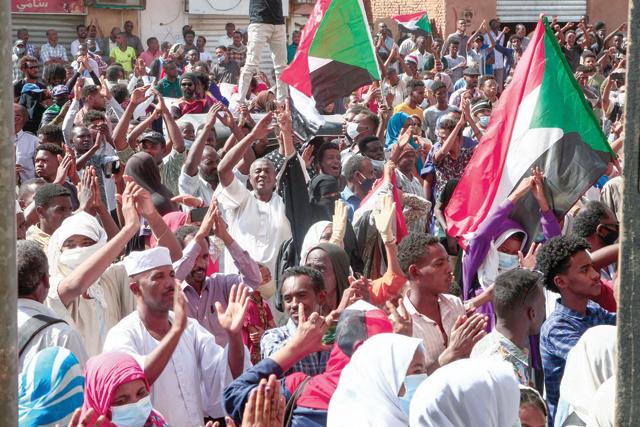You are here
Tens of thousands in Sudan anti-coup rallies as tear gas fired
By AFP - Dec 26,2021 - Last updated at Dec 26,2021

Sudanese protesters burn a tyre at the scene of confrontations with security forces in the capital Khartoum, on Saturday (AFP photo)
KHARTOUM — Tens of thousands of Sudanese protesters rallied Saturday two months after a military coup, demanding that soldiers "go back to the barracks" and calling for a transition to civilian rule.
Waving flags, beating drums, dancing and chanting, crowds marched on the streets of Khartoum despite severed communications and a heavy presence of security forces who later fired tear gas to disperse them.
An AFP journalist saw injured people being evacuated by demonstrators.
The Doctors' Committee, part of the pro-democracy movement, reported that security forces fired tear gas into hospitals, attacking doctors as well as the wounded.
Officers had earlier barricaded bridges connecting the capital to suburbs, cut phone lines and restricted internet access ahead of the planned protests.
At least 48 people have died in crackdowns during weeks of demonstrations, according to the Doctors' Committee, and Khartoum's state governor has warned that security forces "will deal with those who break the law and create chaos".
Demonstrators converged on the presidential palace in Khartoum, the headquarters of the military government in control since General Abdel Fattah Al Burhan seized power on October 25.
International pressure
Burhan held civilian leader Prime Minister Abdalla Hamdok effectively under house arrest for weeks.
After international pressure including a cut-off of vital aid, Burhan reinstated him on November 21 under a deal promising elections for July 2023.
The move alienated many of Hamdok's pro-democracy supporters, who dismissed it as providing a cloak of legitimacy for Burhan's coup.
"What happened on October 25 was a coup... and we will not stop demonstrating until we have a civilian government," a masked woman protesting near the presidential palace told AFP on Saturday.
Othman Mustafa, a 31-year-old demonstrator, said: "We don't just want the military out, we want to choose our own Sudan that looks like us, that responds to our demands and gives everyone equal rights".
As well as rallies in Khartoum and its suburbs, protesters also marched on the streets of Wad Madani, a city around 150 kilometres to the south, witnesses said.
Others reported demonstrations at Atbara in the north and Port Sudan on the Red Sea coast.
Internet cut at dawn
Security forces with cranes used shipping containers to block the bridges across the Nile River connecting Khartoum to the sister cities of Omdurman and North Khartoum, and web monitoring group NetBlocks reported mobile internet services cut at sunrise on Saturday.
Activists reported the arrest of several colleagues from Friday night onwards, and Volker Perthes, the United Nations special envoy to Sudan, urged the authorities to “protect” the protests, not prevent them.
“Freedom of expression is a human right,” Perthes said on Saturday, adding that it includes “full access” to the Internet.
“No one should be arrested for his or her intention to protest peacefully,” he said.
The Doctors’ Committee called on the world “to monitor what happens in Sudan on the issue of the revolutionary movement for freedom and democracy”.
Khartoum’s governor warned that “approaching or attacking buildings of strategic sovereignty is punishable by law”.
A spokesman for UN Secretary General Antonio Guterres condemned “looting and reported violence occurring around the former United Nations logistics base in El Fasher” since Friday, in part of the base handed over to local Sudanese officials.
At rallies on December 19 crowds began a “sit-in” protest outside the presidential palace. It recalled the action which ultimately led to the ouster of veteran strongman Omar Al Bashir three years earlier after mass demonstrations.
Rape used as ‘weapon’
But this time, within hours, security forces dispersed the thousands of protesters with truncheons and tear gas.
Activists have condemned sexual attacks during the December 19 protests, in which the UN said at least 13 women and girls were raped.
Sudan, one of the world’s poorest countries, has a long history of military coups, enjoying only rare interludes of democratic rule since independence in 1956.
More than 14 million people, roughly a third of Sudan’s population, will need humanitarian aid next year — the highest level for a decade, according to the UN Office for the Coordination of Humanitarian Affairs.
Activists say more demonstrations are planned for December 30.
Related Articles
KHARTOUM — Sudanese security forces fired tear gas Tuesday at anti-coup protesters in Khartoum chanting slogans against the military days af
KHARTOUM — A Sudanese protester was shot dead during a "savage" crackdown on mass pro-democracy rallies on Sunday, medics said, and 125 othe
KHARTOUM — Sudanese security forces killed two protesters on Sunday, medics said, as thousands braved tear gas, a heavy troop deployment and














